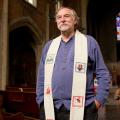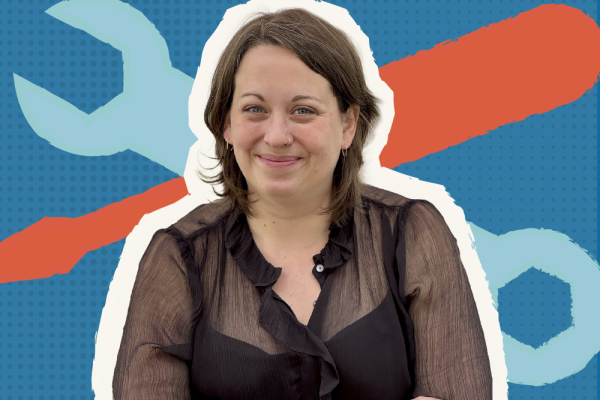IN AUGUST, LEADERS of the United Methodist Church from around the world are scheduled to meet, in Minneapolis and/or online. The denomination’s future will be on the table as delegates address the decades-old debate about full inclusion of LGBTQI members, including in same-sex marriage and ordination. Meanwhile, congregations around the U.S. and elsewhere have taken various approaches to the pastoral realities of their members. Lydia Wylie-Kellermann and her father, retired Methodist pastor Bill Wylie-Kellermann, explain what it meant to support each other through Lydia’s wedding and the ecclesial reverberations that followed. Editor's note: After this issue went to print, the UMC postponed the 2021 General Conference until 2022.
Lydia Wylie-Kellermann: This is a story about risk and fear. It is a story about love. And it’s about the moments when standing beside the ones you love becomes an act of justice. It is the kind of story that begs us to ask what it means to be church. It is an ordinary story turned holy by the common occurrence of the very personal moments of our lives interacting with structural injustice and the way resistance and love unfold.
Ten years ago, I married Erinn. It was in a political moment when gay marriage was illegal and most denominations were still forbidding it.
Yet we were clear that we were not merely roommates or partners, but that marriage was a vocation we were summoned to together. We had no doubt that our relationship was blessed by community and by God. We wanted to promise our lives to one another and publicly offer our marriage as a gift back upon community.
It was a moment of total clarity for me, yet it was also really scary. We had to climb the steps of the church fearing we would pass through a line of protesters. We entered the sanctuary feeling the loved ones missing in the pews because they couldn’t support our marriage. We walked hand in hand down the aisle, combatting our own internalized homophobia, showing our love publicly with hands, promises, and kisses.
We could not have done it without the love of community. The dearly beloveds who filled that church held our hearts and knees steady.
One of those people that stood beside us and laid his hands upon us was my dad. He loved us, celebrated us, and summoned God to move in and through the day and into the rest of our lives. He co-officiated our service. As an ordained Methodist pastor serving a spunky, activist Episcopal church, he was risking losing his orders and losing his job.
Bill Wylie-Kellermann: Those were real fears. For as long as I can remember, I had said to myself that if a member of my congregation asked me to preside at a same-sex wedding, one discerned in pastoral care, that I would certainly do it. I was navigating a contradiction in the United Methodist Book of Discipline that enjoined me to offer pastoral ministry to all members in my care but a couple of paragraphs later forbade me to offer sacramental care to particular parishioners. This marriage was essentially pastoral work, but one that functioned as a public action of civil and ecclesial disobedience. I took comfort in Jesus’ ministry, where a personal act of healing would publicly violate Levitical laws of purity, say, putting him in trouble.
Consequences were unknown. Pastors in other conferences had been defrocked or suspended, but this was a first in Michigan, so untested.
Let me add something learned in discerning nonviolent direct actions: Fears can actually be in the service of the Holy Spirit. Often as not, the thing you are afraid of is the very thing you are being called to do. Acknowledged or confessed, fears may point the way. Suppressed or denied, they become inflated and, in the service of the powers, hold you back.
So, I put the church on notice, sending my bishop a letter in advance. Charges were filed against me immediately by his cabinet, and I was summoned to appear on a date certain, to begin an administrative process, or eventually trial.
Lydia: The summoning letter from the bishop arrived and indicated that my dad was to bring a support person. Usually, when your orders are at risk, you might wisely choose to bring a prominent pastor or even a church lawyer. But he walked over to my house with worried, furrowed brow, stood in my living room, and said, “Will you come with me?”
My dad stood beside me when I got married in what he declared a gospel act, and now it was time for me to stand beside him for an ordinary and sacred action that I believe was also a gospel act. Yes! It was a no-brainer. This time, I would love him, celebrate him, and summon God to linger in the corners of that conference building.
I showed up that day with knees quivering, holding the full intention of being an emotional, spiritual, and physical support to my dad. But it was immediately clear that I was not supposed to be there. I had to be navigated around. My presence changed the conversation.
Simply by sitting awkwardly at the long, wooden table, we managed to humanize the conversation. It was not as easy to talk about “homosexuals” harming the church when they had to look into my eyes and speak of my love and my life.
My dad was being accused of “harming the Discipline.” Simply with our presence and clarity, we rearranged the question of who was being harmed. For generations, LGBTQI people have been hurt, excluded, and abused in our churches. We have been told that we can’t be who we are and that to God our existence is criminal and sinful. The mere fact that my marriage was listed in the Discipline—sandwiched between the crimes of racism, pedophilia, and adultery—speaks volumes to how we have been seen in the church.
Bill: That day, they set before me a document that I could sign and walk—acknowledging that I had violated the Discipline and promising not to do so again. They expected I would take the deal, but I pushed it away. I didn’t want to rest on the sort of “family exceptionalism” it seemed to offer. Plus, my conviction was such that I would do it again (and have).
My surprise came when the bishop turned things around and asked that we return in a week with our own proposal for a “just resolution.”
Both of us were aware of how denial of marriage had been employed, with complicity from the church, in a history of various oppressions. Enslaved people were denied marriage, as it might stand in the way of quick and easy sale—which is to say, the only legal relationship was with the master. (Hence, enslaved people developed underground and alternative rituals, such as jumping the broom.) Denying interracial marriage in Jim Crow and years beyond functioned similarly, to justify and regulate segregation.
So, on the day appointed, we brought a document that included reflection on Martin Luther King Jr.’s Birmingham jail letter, detailing civil (and by analogy, in this case, ecclesial) disobedience, how breaking unjust laws or disciplinary paragraphs is justified, where the harm was caused by the law itself rather than by its violation.
It set forth a proposal for a restorative justice process, inviting LGBTQI folks, representatives both from congregations actively opposing same-sex marriage and “reconciling congregations,” members of the bishop’s cabinet and the conference Board of Ordained Ministry, plus ourselves.
It also included a “signable confession,” to which I’d gladly put my hand:
On Oct. 8, 2011, I celebrated and participated fully in a covenant service of worship wherein Lydia and Erinn married one another before friends and community in Detroit. I did this wholeheartedly with great joy, and praying in it to proclaim the gospel of Jesus Christ and God’s great love, to offer a witness of restorative justice, to be faithful to my calling as pastor and elder, to honor the sacred covenant of ordination under which I share, even to support and maintain the Discipline of the United Methodist Church, and to be accountable to the bishop, the order, and the Discipline—though in doing so I was fully mindful that I violated a provision of par. 2702.1b. In all these intentions I trust the grace of God in Jesus Christ and ask the grace of my sisters and brothers in church and covenant.
The bishop accepted it all. To be honest, the restorative process, well enough designed, was poorly implemented by the conference—powerful testimony rendered almost perfunctory. It did, however, provide a foundation for more recent cases in our church and contributed to a gathering denominational storm.
Lydia: The wedding now feels like a long time ago. It is hard to remember the fear I felt that day because the political moment changed so quickly. Within a couple of years, gay marriage was made legal across the country. I’ve often looked back and thought how far we’ve come in such a short time.
And then the world shifted under our feet again. These last four years have been agonizing as we moved into a time when hate crimes were sanctioned and even summoned by our then-president. Two summers ago, in Detroit, neo-Nazis marched down Woodward Avenue to the Pride Festival carrying shields and guns and shouting “F*** the faggots.” The next day, I held my fears as Erinn prepared to take our 3- and 6-year-olds to the Pride Parade. Yes, it would be good for our kids to go. Yes, it was important political work just to show up. But I cannot deny that when we went through metal detectors to get into Hart Plaza, I was disturbed by my own gratitude for the enhanced security.
Over the last year, the violent threats have loomed in the light. White men carry guns and nooses protesting stay-at-home orders. Black Lives Matter participants experience the real possibility of guns being fired at them. Black folks and particularly trans folks are being lynched. White supremacy, coupled with homophobia and transphobia, has been given permission to publicly arm itself and commit murder in the streets.
Stories of fear, risk, and courage are still crucial and urgent—they summon us to ask the questions: Where are we showing up? Who is at our table? What places of fear am I called to walk into with courage? For what am I willing to risk my job, my home, my reputation, my life? In this time of hate and violence, what does it mean to be church?
Bill: In United Methodism, the storm finally broke. Preparations have been made for a formal split in our denomination. The unity of the church, indeed of all humanity and even creation, is central to the gospel. Sacramental marriage may even be an emblem of it. Ironically, commitment to that unity can involve drawing clear lines.
I think of Dietrich Bonhoeffer in this regard. From the moment that the Aryan clause was imposed on the German church, which forbade ordination to those who would marry spouses of Jewish descent, and those who were themselves of Jewish descent, Bonhoeffer thought the gospel so assaulted by it that a status confessionis existed—cause for declaring separation. Others, such as Karl Barth, argued for going slow, and eventually when the separation occurred, it did more fully address the theological idols of Nazism. But the impetus was there from the beginning.
I am among those who hold that foreseeable separation in Methodism is an opportunity to gather a new church, committed not just to LGBTQI inclusion but to gospel nonviolence in ways that mark resistance to everything from white male supremacy to militarism and nuclear weapons and to the economic structures of poverty. The queer community is leading us into that.
A new generation of young Methodists is laying the groundwork for this work of transformation. They seek an intersectional church that is the beloved community—one committed to the nonviolence of Jesus; a sanctuary and safe space for those targeted and vulnerable to assault; one that takes liturgy and witness to the streets and embraces shalom—truly a justice and peace church. That is the opportunity of our moment as United Methodists. And it’s all right on time for this cultural and historical moment.
Lydia: Indeed, we are right on time, in that it is always the moment to reimagine church in the shape of the gospels. May we summon the ancestors and ancient stories that prod our dreaming and remind us who we are and where we come from. May we listen to folks on the margins who are so often on the edges of institutional church and yet seem to understand within their bones what it means to be church. May we listen for the Creator who dwells in our fears and reminds us of our courage. And may my life and your life and all our lives be gathered up with all creation and force justice to roll down like a mighty stream.

Got something to say about what you're reading? We value your feedback!








